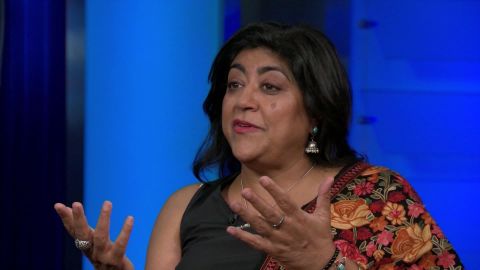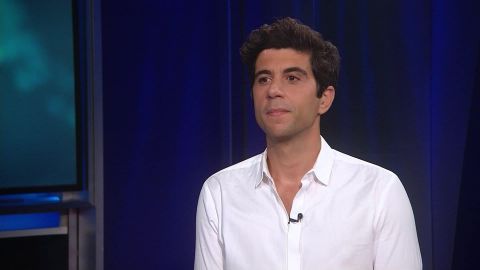Read Transcript EXPAND
CHRISTIANE AMANPOUR: Tell me what kind of bridges you’re trying to build at this moment in Germany.
JAAFAR ABDUL KARIM, HOST, “JAAFARTALK”: These moments in Germany, there’s a lot of the unknown because 2015, you have a huge number of people coming from Syria, from Iraq and Afghanistan arrive to Germany or fled to Germany. So, people coming, arriving in Germany, the Germans have a lot of questions, who are these people? What culture do they have? What does their religion say? How do we want to live together? So, there is a lot of questions. And since I understand both cultures, I am familiar with the European, with the German culture, but also with the Arab/Muslim culture, and that’s why I try to bring people together and let them talk, exchange, know each other more, because there is a lot of prejudgments against each other. So, when you bring them together, they know each other more to support the dialogue. They don’t always have to agree, they often disagree, but at least you have people talking to each other.
AMANPOUR: So, you talk about prejudice, and certainly, we’ve seen this Germany since the influx of about a million refugees that Angela Merkel allowed in —
KARIM: Yes.
AMANPOUR: — in a policy of compassion and humanity, really.
KARIM: True.
AMANPOUR: But it did have quite a lot of backlash, both personally and politically.
KARIM: Yes. True.
AMANPOUR: So, one of the casualties was this far-right group, AFD.
KARIM: Yes.
AMANPOUR: Or Democracy was a casualty because this group got into parliament. We’re going to play this clip from one of your shows where you engage in one of the members of the community in Saxony —
KARIM: Yes.
AMANPOUR: — which is where AFD is very strong.
KARIM: Yes. OK.
AMANPOUR: Here’s the clip.
(BEGIN VIDEO CLIP)
KARIM (through translator): What bothers you most here on this street?
UNIDENTIFIED FEMALE (through translator): The housing conditions and all the people around here.
KARIM (through translator): What do you mean?
UNIDENTIFIED FEMALE (through translator): I just mean all the asylum seekers that got shipped here. They could have asked the people here if they agreed or not. In just those two buildings over there, there are at least 10 families.
KARIM (through translator): And you don’t think that’s OK?
UNIDENTIFIED FEMALE (through translator): No, I don’t because there are enough German homeless. And in my opinion, they should get an apartment first before someone comes here from far away. Whatever the history is, the German come first, no one else.
KARIM (through translator): Hi. What’s it like to live here?
UNIDENTIFIED MALE (through translator): Well, quite bad.
KARIM (through translator): Why?
UNIDENTIFIED MALE (through translator): The East, the mentality of East Germans.
KARIM (through translator): What do you mean?
UNIDENTIFIED MALE (through translator): There are so many Nazis.
KARIM (through translator): Have you experienced anything?
UNIDENTIFIED MALE (through translator): Yes. I opened my mailbox like always to see if I had some mail. Suddenly, I saw a piece of pig meat. They know I was a Muslim and didn’t eat pork. I just left it there, the next day it really stunk.
About This Episode EXPAND
Scott Jennings and Christiane Amanpour discuss the latest instance of gun violence in the United States between police officers and a gunman in Philadelphia. Journalist Jaafar Abdul Karim explains his efforts to build bridges between the far-right and Germany’s migrant community. Gurinder Chadha and Sarfraz Manzoor tell Hari Sreenivasan about their new film “Blinded by the Light.”
LEARN MORE


